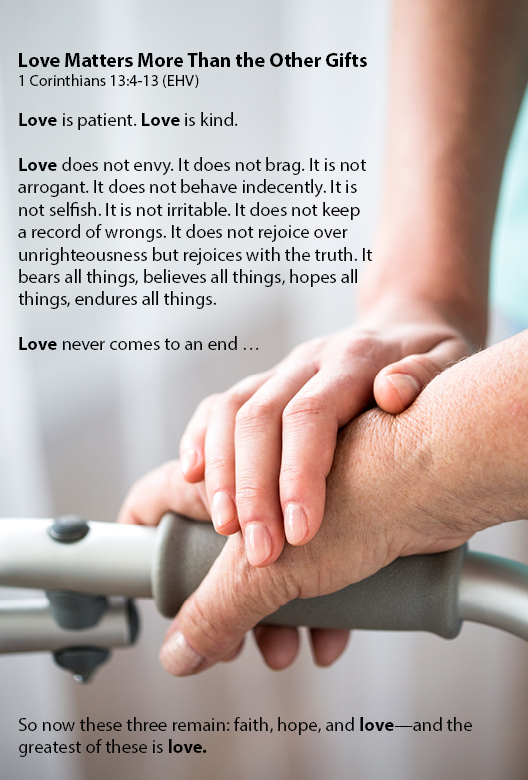 Whenever I read Scripture that talks about how much God loves each of us, that He has created us, and that He wants us to share His love, I am always struck by the lack of qualifiers. I do not see where God makes distinctions about who He loves and calls into His family. He loves and calls all—each and every one of us.
Whenever I read Scripture that talks about how much God loves each of us, that He has created us, and that He wants us to share His love, I am always struck by the lack of qualifiers. I do not see where God makes distinctions about who He loves and calls into His family. He loves and calls all—each and every one of us.
In my field of disability ministry, I often point this out to others. In 1 Corinthians 12, the wonderful word picture of the Body of Christ, it does not say all are part of the body except people with disabilities or differences.
In 1 Peter 4:10, it does not say as each, except those with disabilities or differences, has received a gift, use it to serve one another.
In the great commission statement of Matthew 28:19, it does not say make disciples of all nations except for the people with disabilities or differences.
In our passage for LFL’s 2019 Life Sunday theme, From Age to Age the Same, I can point this out yet again.
You “have been borne by me from before your birth, carried from the womb; even to your old age I am he, and to gray hairs I will carry you. I have made, and I will bear; I will carry and will save.” (Isaiah 46:3b-4)
There is no mention of only a select group for whom this applies. No person or group has priority, nor can any be discounted.
We humans so very often set aside or exclude those who bring feelings of discomfort. Typically, that is because they are different from us. We think those differences make a difference. It might be the unmarried pregnant woman, the person in a wheelchair, a post-abortive woman, someone without speech or hearing, or someone living with mental illness or suicidal thoughts. We feel uncomfortable. We say, “They make us uncomfortable.” So, we distance ourselves. But, maybe it’s as much because they remind us or make us aware of our own inadequacies—THAT is truly uncomfortable.
Jesus was the Master of making people uncomfortable. His parables are full of examples and stories and word pictures to point toward a new way of thinking. Paul says to us at the end of the Body of Christ passage: “and I will show you a still more excellent way” (1 Corinthians 12:31b). This is followed by the famous chapter on the Way of Love, 1 Corinthians 13.
Love is blind, so the popular saying goes. If only it were so. We have regular examples in the global and national news, in our communities, in our congregations, in our social groups, and in our own homes that disprove that saying. Most kinds of love are not blind. We select those whom we feel are worthy of even our attention, let alone our love. But God calls us to agape love in which every person is lovable simply and primarily because they are a child of God. Our call is to introduce and invite, welcome and include, respect and value, and share the Good News with every brother and sister in the family of God—person to person and From Age to Age the Same.